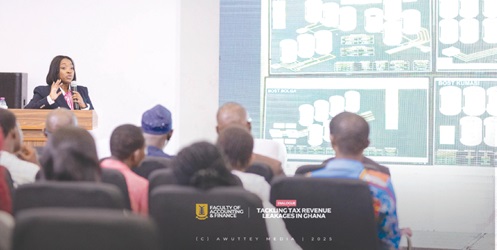Ghana’s persistent fiscal losses, amounting to US$9.02 billion annually, stem primarily from weak enforcement, outdated systems and entrenched collusion between officials and private actors, according to the Dean of the Faculty of Accounting and Finance at the University of Professional Studies, Accra (UPSA), Professor Isaac Boadi.
Speaking at a dialogue hosted by the faculty on the theme: “Tackling Tax Revenue Leakages in Ghana”, Prof. Boadi warned that unless these systemic flaws are addressed decisively, the country’s aspirations for fiscal stability and sustainable growth will remain out of reach.
“This crisis is not because Ghana is broke; it is because we are bleeding.
The US$9 billion we lose each year is not an abstract figure — it represents unbuilt classrooms, empty hospital shelves and deferred national aspirations,” he said.
The presentation drew on data from the Auditor-General’s 2023 report and other sources, which show that revenue leakages span critical sectors.
These include illicit financial flows costing US$3 billion annually, customs under-invoicing resulting in a US$950 million shortfall, and gold mining losses exceeding US$2 billion.
The oil and gas sector has seen US$1.5 billion in unaccounted revenues since 2020, while the cocoa sector loses US$150 million every year through smuggling.
Prof. Boadi also identified the informal sector as a substantial gap, with an estimated GH¢15.6 billion slipping through the tax net annually despite mobile money transactions exceeding GH¢1 trillion in 2023.
He attributed these persistent losses to four interlinked factors: the weak enforcement of tax laws, outdated manual processes that enable manipulation, institutionalised collusion between officials and smugglers, and a pervasive lack of transparency, particularly in public procurement and natural resource contracts.
“The real enemies are not political opponents; they are corruption and institutional decay.
Without plugging these leaks, any talk of fiscal consolidation will remain a mirage,” he said.
SML’s role critical to curb losses
On the sidelines of the event, Prof. Boadi underscored the critical role of institutions such as Strategic Mobilization Ghana Ltd (SML) in efforts to curb the bleeding of public finances.
“Organisations like SML provide vital audit and real-time monitoring services, especially in sensitive sectors such as petroleum.
They are an important part of the solution because they create an independent verification layer that reduces the opportunities for leakage,” he said.
However, he cautioned that any attempt to tighten revenue collection systems would meet fierce resistance from entrenched interests who benefit from the status quo.
“We should expect violent pushback — not necessarily in the physical sense, but through legal challenges, media attacks, political lobbying and orchestrated public disinformation campaigns,”
Prof. Boadi said. “The networks benefiting from the leakages are well-resourced and will fight to maintain their privileges,” he added.
In light of this, he urged the government and broader society to prioritise support for indigenous companies that demonstrate competence and integrity.
“Supporting credible local companies like SML is not just an economic imperative; it is a national security issue.
Foreign multinationals will not have the same patriotic incentive to protect Ghana’s revenues, and excessive reliance on them risks externalising control over our fiscal lifeblood,” he said.
During his presentation, Prof. Boadi laid out a four-point plan to stem the losses.
They are: digitising revenue systems across tax collection points, imposing strict sanctions, including asset seizures and jail terms for tax evaders, enhancing public transparency by publishing contracts in extractive sectors, and formalising the informal sector through mobile money integration and SME registration initiatives.
He warned that failure to act would deepen youth unemployment, force further austerity through unsustainable borrowing, and erode critical social services.
“The data is clear, the victims are real, and the solutions demand courage from all stakeholders — government, private sector, and citizens alike,” he said.
The Director of Support Services at SML Ghana, Dr Yaa Serwaa Sarpong, offered a preview of the company’s upstream monitoring capabilities during the same event.
She said the system replicated the downstream monitoring architecture and provided the Ghana Revenue Authority (GRA) and other state agencies real-time insight into crude oil production and offtake volumes.
“In real time, Ghana will be able to know exactly what is going on upstream.
We know how much petroleum products, how much that has been extracted and sold, and are being taken offshore,” she said.
The dialogue forms part of broader efforts by the UPSA Faculty of Accounting and Finance to stimulate informed debate on addressing Ghana’s revenue mobilisation challenges.
Other speakers at the conference were Dr Eric Boachie Yiadom, Lead Consultant-GreenVista and Senior Lecturer, UPSA; Prof. Douglas Boateng, Africa’s 1st Professor, Supply Chain Management and Founder of PanAvest International; Dr Charles Gyamfi Ofori, Policy Lead, Climate Change and Energy Transition, Africa Centre for Energy Policy; Dr Priscilla Twumasi Baffour, Senior Lecturer, Department of Economics, University of Ghana; Abigail Maame Esi Mensah, Manager, Business Tax Advisory, Sub-Service Line of Ernst & Young, and several others.

